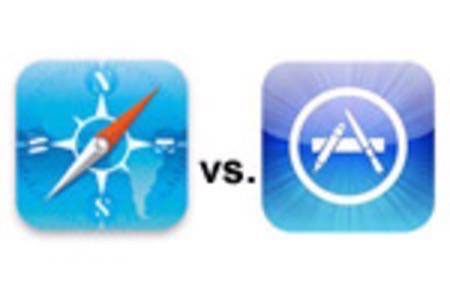Last week I had the chance to attend Qualcomm’s Uplinq 2010 conference in San Diego where I was able to sit it on several interesting discussions about mobile technology and its future. One of the sessions I was particularly interested in was a chat about the tools being created to improve web development optimized for mobile devices. Qualcomm engineer Bijan Amirzada showed off some interesting new capabilities within mobile Web browsers, but one assertion he made has since been stuck in my mind: will Web-based apps eventually dethrone native applications on mobile devices?

This same move from native applications to Web apps is happening as we speak on desktop computers. I am writing this very article on Google Docs because, to me, it’s just as good as any desktop word processor and it automatically saves my work to the cloud. Universal access from multiple devices is large reason why Web apps have taken off for desktop users, but native mobile applications have not yet made this same leap.

That same desire to have our data at any time doesn’t influence mobile development as much because our phones are portable and are already with us all day. Web apps for mobile will instead have to rely on other ways to attract users away from native applications. To do that they will first need strength in numbers, and that means attracting developers, and as Amirzada explained, there are several reasons developers should be excited about mobile Web development.
Attracting the Mobile App Developers
The first is the simplicity of the coding itself. Experienced Web developers are more likely to pick up mobile Web development than, say, iPhone app development. Developers can use HTML, CSS and JavaScript to create Web apps instead of learning new languages to code native applications. Native app development may not be the hardest of tasks from a developer’s point of view, but Web development is a skill they have likely already mastered and are adept at.

Secondly, as Amirzada pointed out, the mobile Web market is much larger than native applications markets. By coding for the mobile Web, app developers can reach a broader audience on multiple devices and platforms in a single stroke. Platforms like iPhone, Android and Windows Mobile (which all use unique languages and techniques to develop applications) only represent a fraction of the overall mobile device market, while the mobile Web is accessible from a much larger number of handsets.
The third and possibly most important reason developers should be attracted to mobile Web apps is that the Web is an open platform. Developers don’t have to spend weeks on an application only to see it rejected for increasingly strange reasons. Steve Jobs can’t censor the Web like he can the iPhone, and there is no waiting for applications to be approved.
Hurdles to Overcome
Unfortunately for mobile Web app fans, these benefits also come with equal and opposite disadvantages. While coding for the Web may be simpler than creating native apps, the native platforms allow the apps to take advantage of the device’s functions and features. From a user perspective, native apps are more appealing because of this. I would rather use an app that felt like it belonged on my phone rather than use a Web app that seems shoehorned onto my device through HTML.
Another problem with Web apps is their performance when compared to native apps, which are streamlined to run as efficiently as they can on the device they are designed for. Amirzada said that this is changing, however, as HTML5 improves on the infrastructure of the Web and makes applications faster and more functional.

He also demonstrated how using open-source JavaScript frameworks, like Cappuccino, on Qualcomm’s Brew mobile platform can give developers access to various device sensors to create richer Web-based mobile apps. The World Wide Web Consortium (W3C) is also working on bringing mobile Web apps up to speed by creating a standard for Web-based push notifications.
But the question still remains – will mobile Web apps one day outpace native applications? The largest push in this direction seems to be the openness of the Web, as closed platforms have turned many developers away from popular native platforms like the iPhone and iPad. But those developers could just switch to Android or Windows Mobile. Once we reach a point where mobile devices have the computing power of our desktop machines, mobile Web apps could make a run on native apps, but that is still likely a few years out.
Let us know what ?you think about mobile apps versus native apps in the comments below!
Disclosure: Qualcomm covered the author’s travel costs to attend Uplinq 2010.









